There are many different types of advertisements in the real estate market. Forget just hanging a sign; realtors are battling for every click, especially with modern real estate platforms emerging. Without killer search engine optimization (SEO), capturing those high-quality leads and showcasing incredible listings becomes a frustrating uphill battle. But how do you cut through the noise and reel in those crucial clients? Simple: SEO.
This blog post is your deep dive into SEO, showing you how to transform your real estate website from a boring digital space into a lead-generating machine.
What Is SEO and Why Does It Matter in Real Estate?
Before we switch to what SEO is for real estate, let’s explore SEO in general. Optimizing your website to rank better on search engines like Google, Bing, and Yahoo is the main goal of SEO. Think of it as making your site more visible to people actively searching for what you offer.
Remember the old days of newspaper ads and gossiping neighbours? Those are history. Now, almost everyone starts their house hunt online.
Key Statistic: Over 90% of homebuyers begin their property search online.
That single stat screams the importance of SEO for every real estate pro who wants to make it in today’s market. Landing on Google’s first page is as crucial as having the most eye-catching property on the block.
Here’s the thing: you need to know the difference between paid ads and organic search. Sure, paid ads can give you a quick boost, but the moment you stop paying, they’re gone. Organic search? That’s about building something real, a solid online presence that lasts. It takes time and effort, but the payoff is huge:
- More traffic flowing to your site naturally
- A reputation as the go-to expert that people actively seek out.
For quick and effective results, you can also combine SEO with other marketing services, such as SMM and PPC.
Key Benefits of SEO for Real Estate Websites
A strong SEO plan isn’t just about showing up online; it’s about getting the proper attention. Here’s what solid SEO can achieve for you:
- Super Targeted Website Traffic: SEO makes sure you’re spotted in searches like “houses for sale in Oakville with a pool,” “pet-friendly condos for rent downtown Toronto,” and “luxury home builders in Vaughan.” By laser-focusing on those specific searches, you’re attracting buyers and renters who are already looking for what you’ve got.
- Higher Quality Leads, Hands Down: SEO for real estate agents is important to attract local homebuyers. Unlike general marketing, SEO gathers users with intent. Someone searching “best realtor in Richmond Hill for first-time buyers” isn’t just browsing. They’re actively looking for an agent. These are hot leads, ready to move.
- Long-Term ROI That Makes Sense: Forget fleeting ad campaigns. Good SEO is a sustainable, reliable source of traffic. Build that strong SEO foundation, and you’ll be pulling in targeted visitors for months, even years, without constantly shelling out for ads. That’s a return on investment you can bank on.
- Brand Authority and Serious Trust: Websites consistently ranking high on Google’s first page are seen as more credible and authoritative, period. Top rankings build confidence in your brand and position you as a leader in the local market. Real estate SEO optimization is crucial for lasting success and helps to grow your audience.
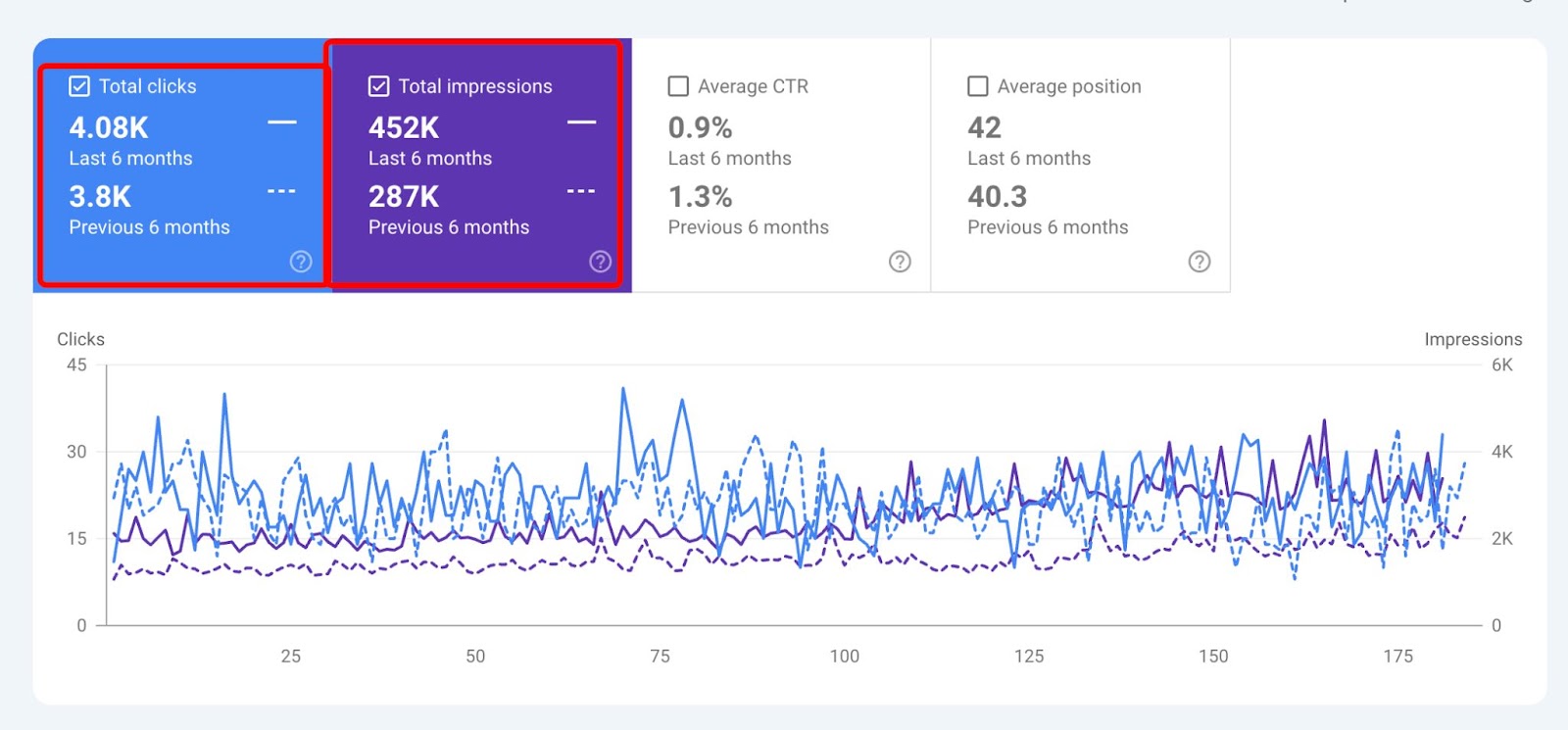
One of our real estate SEO projects is Big City Realty Inc., where we saw a strong increase in total clicks and impressions as a result of our SEO efforts.
Core SEO Strategies for Real Estate Success
Are you prepared to elevate your real estate website to a new level? Concentrate on these important tactics:
1. Local SEO Optimization
Local SEO is non-negotiable for real estate agents. Here’s how to grab the attention of nearby clients:
- Google Business Profile – Your New Best Friend: Claim and completely fill out your Google Business Profile (formerly Google My Business). Name, address, phone number, hours – the whole information. Most importantly, bug those happy clients for reviews!
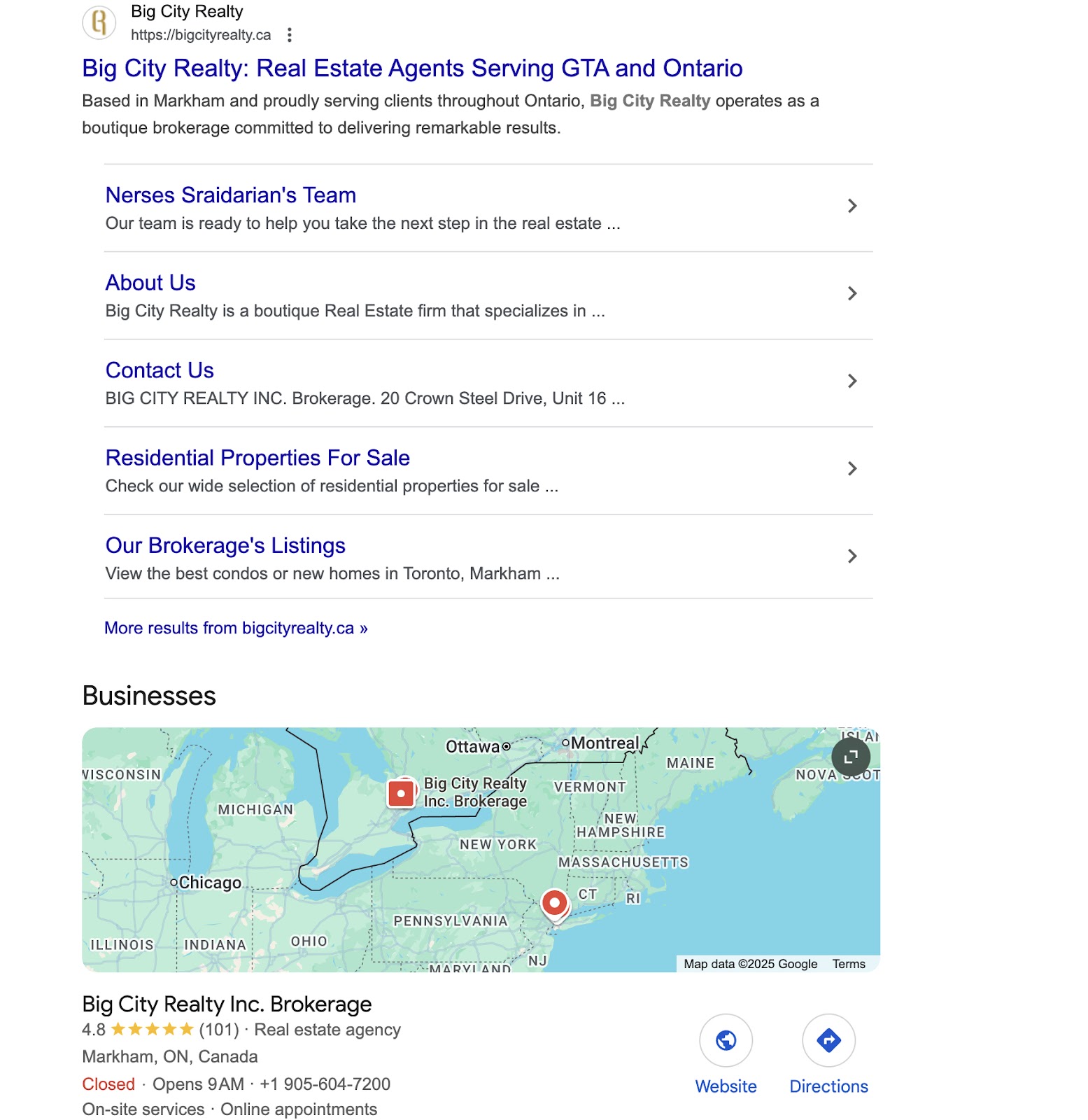
- Location, Location, Location (in Your Keywords): Sprinkle location-specific keywords throughout your website content. Think “homes for sale in Brampton with a finished basement,” “commercial real estate in downtown Hamilton,” or “investment properties in Kitchener and Waterloo.” For example, doing SEO in Toronto or in other regions will help you rank specifically in that area.
- Get Backlinks from Local Bigshots: Score backlinks and citations from local websites, community groups, news sites, industry publications, and business directories.
- Geo-Targeted Landing Pages: Build specific landing pages for each neighbourhood you serve. Highlight the best features, local amenities, schools, and lifestyle perks.
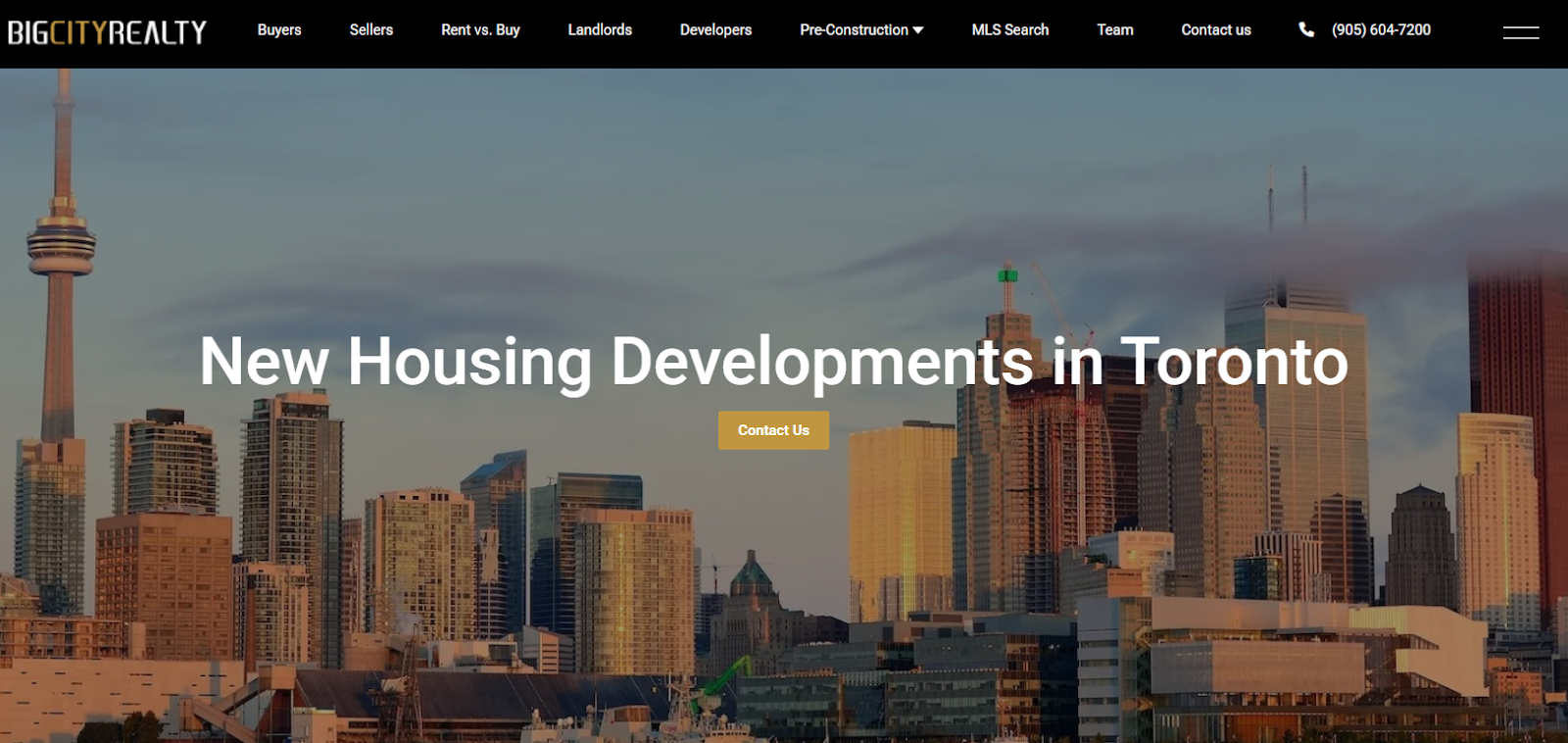
2. Keyword Research for Real Estate
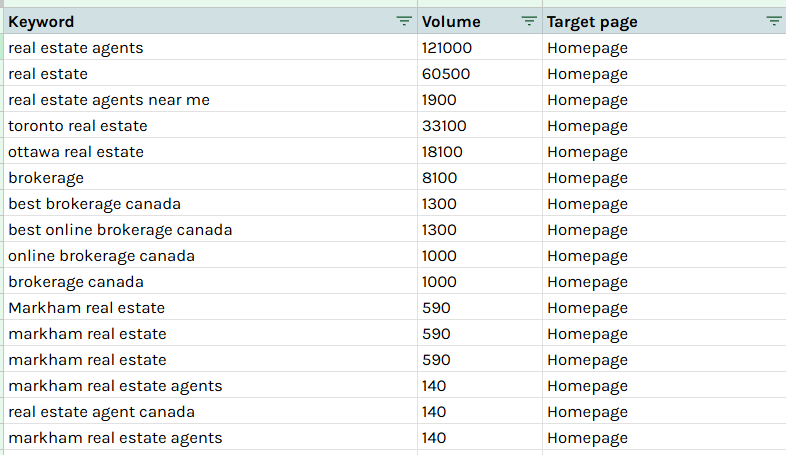
The foundation of any SEO plan is keyword research. It’s all about figuring out what your target customers are actually typing into search engines when they’re hunting for real estate services.
- Target Intent-Driven Keywords: Focus on keywords that show someone is ready to buy or sell. For example, “sell my house fast for cash,” “modern condo with a stunning panoramic view,” or “first-time homebuyer programs for low-income families.”
- Arm Yourself with SEO Tools: Dive into tools like Google Keyword Planner, SEMrush, Ahrefs, or Moz Keyword Explorer to uncover valuable keywords, analyze search volume, and size up the competition.
- Embrace Long-Tail Keywords: Think specific. Instead of “houses for sale,” go for “3-bedroom houses near downtown Oakville with a big, fenced backyard and updated appliances.” It’s all about speaking directly to what searchers want.
3. On-Page SEO Essentials
On-page SEO is about fine-tuning your website, both the content and the underlying structure, to boost visibility, rankings, and user experience.
- Craft Good Title Tags, Headers, and Meta Descriptions: Compelling title tags, headers (H1, H2, H3), and meta descriptions (those short snippets under the title) are your chance to grab attention on the search results page. Make them accurate, concise, and keyword-rich, but still reader-friendly
- Think Internal Linking Structure: Create a smart web of internal links connecting related pages. It facilitates user navigation and aids search engines in comprehending your content. You can strategically link your high-value real estate platform development page to your key landing pages.
- Mobile-First and Lightning Fast: Your site must be mobile-friendly and load super-fast. Google prioritizes mobile-first indexing, and slow load times will kill your rankings and turn potential clients away.
4. Content Marketing Strategy
Creating great content that answers your audience’s questions is key to attracting and engaging them.
- Answer Buyer/Seller Questions in Your Blog: Tackle common questions and concerns with helpful blog posts. Examples: “What to Expect During a Home Inspection,” “Tips for Staging Your Home to Sell,” or “Understanding Mortgage Pre-Approval.” This will also be beneficial in the world with AI-driven search and help you to appear in the AI overview section.
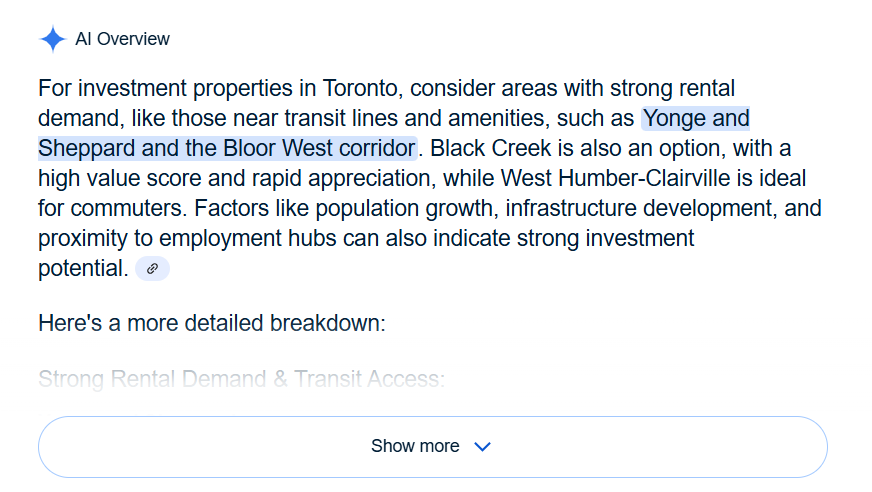
- Become the Neighbourhood Expert: Create in-depth guides to the neighbourhoods you service. Highlight amenities, schools, architecture, parks, and the overall lifestyle. Keep your audience updated on market trends, prices, inventory, and other key factors.
- Balance Evergreen and Timely Content: Mix content that stays relevant for a long time (“evergreen”) with content that addresses current events, news, or trends, such as mortgage rate changes or new regulations.
5. Technical SEO
Technical SEO focuses on enhancing the backend elements of your website to ensure search engines can effectively crawl and index your content.
- Make Sure Search Engines Can Find You: Ensure search engine crawlers can easily access and index all the important pages on your site.
- Use Structured Data for Listings (Schema Markup): Add structured data markup (Schema.org vocabulary) to give search engines detailed information about your listings, such as price, location, bedrooms, features, amenities, etc.
- Optimize XML Sitemaps and Robots.txt File: Submit an XML sitemap to guide search engines in finding and indexing your website’s content efficiently. Utilize a robots.txt file to specify which pages should or shouldn’t be crawled by search engines.
6. Link Building & Online Authority
A strong backlink profile (links from other websites to yours) is crucial for building authority and trust with search engines.
- Reach Out to Local Blogs and News Sites: Contact local blogs, news sites, community groups, and business directories to request backlinks to your site.
- Guest Post on Real Estate Websites: Contribute high-quality guest posts to reputable real estate websites in exchange for backlinks.
- Get Listed on Aggregator Sites (Zillow, Trulia, Realtor.ca): Make sure your listings are on all the major real estate aggregator sites to maximize your visibility. It can also benefit your real estate firm to have your site listed there.
Tracking SEO Performance
Launching an SEO strategy without tracking performance is like driving without a speedometer. Here’s how you can tell if your efforts are delivering results:
- Monitor Key Metrics: Keep an eye on organic traffic, bounce rate, conversions (leads, forms, calls), and time spent on site.
- Use Analytical SEO Tools: Tools like Google Analytics 4 (GA4), Google Search Console, Ahrefs, SEMrush, and Moz Pro are your friends.
- Track Real Estate-Specific KPIs: Monitor time spent on listings, contact form submissions, phone calls from the website, and downloads of guides or brochures.
Common SEO Mistakes Real Estate Sites Make
Even pros can make mistakes. Here are common SEO mistakes to avoid:
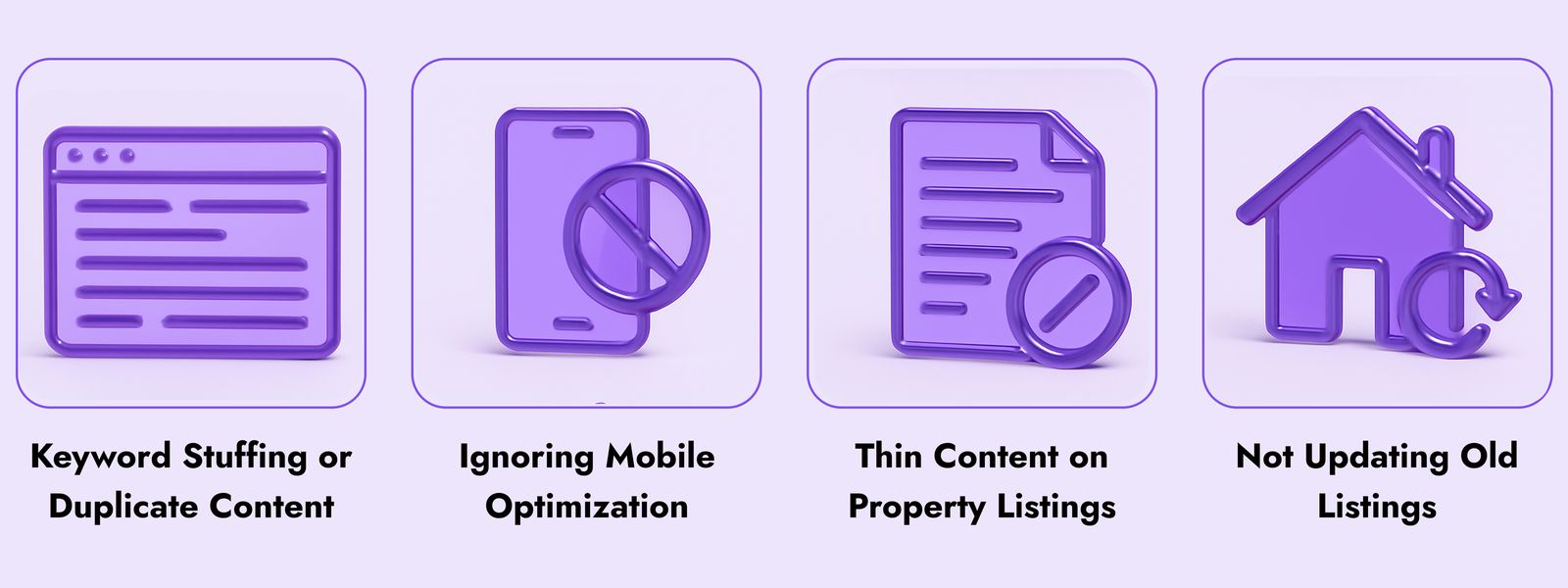
SEO is an investment for any real estate agent who wants to thrive in today’s digital world. Implement the strategies mentioned above, and you’ll increase traffic, attract quality leads, and build a sustainable online presence. From SEO services for real estate to real estate platform development, the opportunities are there when you prioritize SEO.
Whether you partner with a real estate SEO expert like Digilite or optimize your website yourself, now is the time to act. Invest in SEO, and you’ll be amazed at your business’s growth.
Looking to elevate your real estate website and boost its performance? Contact Digilite today for a free consultation. We have expertise in SEO services for real estate firms!




